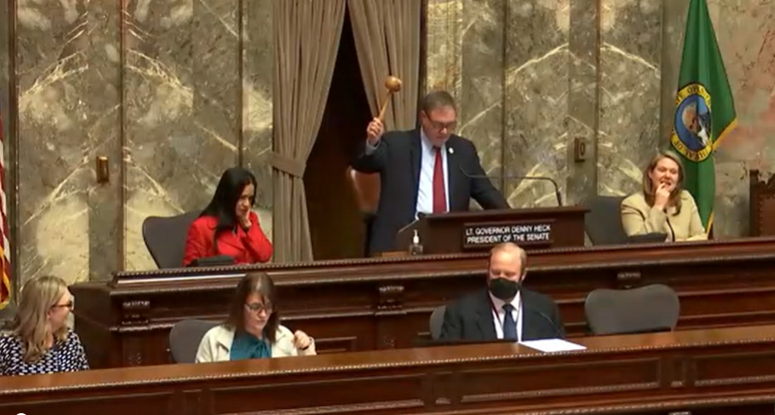Topics:
July 12, 2023
Modest Wins, Minor Losses for Small Business in 2023 Session of the Washington State Legislature
NFIB Washington State Director Patrick Connor reports from Olympia on the small-business agenda following the 2023 session of the Washington State Legislature.
Session Overview The 2023 session of 68th Washington State Legislature returned to an in-person format with the end of the COVID-19 pandemic. Committee hearings continued the pandemic-era remote public-testimony experiment, allowing the pubic and others to participate in committee meetings from the comfort of their home or office – anywhere in the country.- 90-day session, adjourned on time
- 47 bills tracked that received a committee hearing or other consideration; supported 19 (40%), opposed 21 (45%), and monitored 7 (15%) where amendments or other activity allowed NFIB to be neutral
- Three bills were signed into law despite our objections, maintaining our 94% success rate killing bills harmful to small business
- Four NFIB priority bills signed into law by Gov. Jay Inslee: HB 1357, HB 1491, HB 1534, and HB 1742
- The state director and NFIB members testified 28 times on bills and amendments important to small business
- 16 NFIB members serve in the State Legislature, including current and retired members
- Health insurance Prior Authorization Modernization Access to affordable, quality health care and health insurance have remained NFIB members’ top concern for decades. This law requires health insurers to allow electronic transmission of medical-provider requests for approval of patient medical procedures, which will greatly expedite review and approval (or rejection) compared to the current, antiquated fax or phone process.
- Homeowner Recovery Fund NFIB was a stakeholder in a multi-year effort to address remedies for homeowners suffering significant financial losses due to shoddy, incomplete, incorrect workmanship or instances of fly-by-night registered contractors who demanded significant deposits or prepayment but failed to perform the work at all. The Department of Labor and Industries (L&I) will administer a new program that provides some additional financial relief to homeowners who have obtained a final judgment against a contractor and its bond. The program will be funded by a one-time transfer from the Contractor Registration Account, a portion of slightly increased contractor registration and renewal fees, and modestly increased fines imposed on unregistered contractors, which haven’t changed in 30 years. Homebuilders also agreed to raising the minimum general contractor bond amount from $12,000 to $30,000 – the first increase in 20 years.
- Business Licensing Penalty Waivers NFIB supported Department of Revenue request legislation allowing the agency to waive or reduce fines and penalties on “late” payments of business license renewals. As COVID demonstrated, there are circumstances beyond a small-business owner’s control that may result in their decision to delay renewing a business license, such as (temporary) state-ordered business closures, the owner’s death or retirement or that of other business leadership or key personnel.
- Unemployment Benefits for Certain Voluntary Quits Over the objection of NFIB and other business organizations, Gov. Jay Inslee signed a bill expanding unemployment benefits to workers terminating their employment due to a change in or lack of access to child or depend care, including those caused by a mandatory shift change where the employer is unable to accommodate the worker’s scheduling requests; personal or family health issues; or to follow a custodial parent’s relocation to maintain visitation and other parental rights. Amendments socializing these benefit costs and a five-year review of program impacts were included in the final version of the bill.
- Wage Complaints NFIB was able to negotiate provisions requiring workers with wage complaints to first begin an administrative review process before suing employers for alleged wage payment violations. We continued to have concerns about the bill language, forcing us to oppose the bill on final passage.
- Ergonomics Similarly, NFIB objected to the latest ergonomics bill. While much more limited in scope and impact than previous versions, the bill allows L&I rulemaking power to target one high-risk industry with a greater-than-average musculoskeletal (repetitive motion) injury rate each year, and mandate workflow, protective equipment changes and use, as well as other modifications to workplaces and workstations in an effort to reduce the repetitive-motion injury rate in the target industry.
- Right to Repair This year it was the Senate Environment, Energy & Technology Committee that killed an NFIB-supported bill to allow consumers and small repair shops greater access to tools, parts, and instructions needed to repair electronic devices like cellphones, tablets, laptop and desktop computers. Manufacturers would have been required to sell these items at fair market prices. Apple opposed the bill, preserving its restrictive and costly process for becoming an authorized service provider, forcing consumers to replace rather than repair damaged devices.

State:
Get to know NFIB
NFIB is a member-driven organization advocating on behalf of small and independent businesses nationwide.
Related Articles

July 16, 2025
Key Small Business Issues in the 2025 State Legislative Session
States wrapped up their 2025 legislative sessions after considering multipl…
Read More


July 9, 2025
2025 New Hampshire Legislature – Small Business Recap
Budget Deal Includes Big Wins, Big Changes for Small Business
Read More


July 8, 2025
Washington Comment on Latest Small Business Optimism Index
With the Small Business Deduction now permanent, future readings might be b…
Read More


July 3, 2025
Washington Comment on Latest NFIB Jobs Report
If future ones are any better, it won’t be because of anything happening…
Read More







